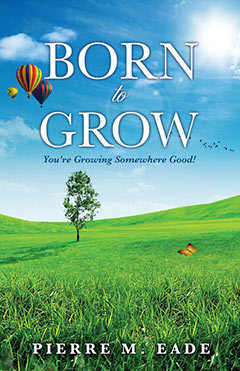Peter Lopez Jr.'s Blog: Xulon Press Blog , page 43
February 11, 2015
Why We Write: To Leave a Legacy
What do you think about when you hear the word “legacy”? Synonyms relating to this word include inheritance, birthright, heirloom, etc. A legacy doesn’t have to be a tangible object; it can also be a treasured word of wisdom, funny anecdote or memory that offers a valuable piece of advice.
Could your life story be considered a legacy you could leave to your family, bequeathing to them life lessons, personal insight and genuine encouragement for their paths ahead?
At Xulon Press, we come across manuscripts from time to time that are created mementos of authors’ life experiences and beliefs, to be given as meaningful gifts to their loved ones for the future. Each one is significant in its own right, as they capture what the author hopes to convey to his/her family about life and seeing events in life as stepping stones to a greater purpose and destiny.
Yet even when it is a compilation of stories to depict the author’s perspective about life, it is a good rule of thumb to write your story with a “game plan” in mind: an approach to maximize the effect of your stories on readers while minimizing their confusion.
When you have made the decision to write your life story, decide what the main theme or purpose will be for your manuscript. Are you a savvy businessperson that wants your life story to center on your knowledge of handling business morally? Or, is your story one about overcoming hardships through faith in God and wanting your family to come away believing with God nothing is impossible?
Keeping this chief theme in mind will help you determine what stories to include in your manuscript and to organize the stories in a way that will support the lessons you wish to impart.
As you start getting into the thick of story determination, take a moment to imagine the events of the chosen stories in your head. Ask yourself if you were to tell someone in person this story, would it take five minutes or twenty-five minutes? A person’s attention span can be shorter while reading than hearing the story face to face, so make sure to choose stories that will be easy to relate to your readers upon first glance.
Also, if your stories require you to explain multiple parts, or is more of an inside joke that carries a “you had to be there” essence, you may want to consider seeing if you can write a condensed version of the story with just the main points mentioned.
Finally, to help your family and readers understand the main lessons with your life story, place in bold lettering a brief sentence of the lesson to learn in each story or in each chapter of stories. This will allow your family to zero in on the guidance to take from the story and not have it lost to misinterpretation.
Making the decision to creating a lasting legacy from the events God fashioned into your life story will be one of the greatest gifts you could ever bestow to your loved ones. Why do you write? To leave a legacy that will last long after you go “home”.
The post Why We Write: To Leave a Legacy appeared first on Xulon Press, Christian Self Publishing.
February 2, 2015
Top 5 questions all future authors ask
 There are 5 top questions all future authors ask themselves. For many, this process actually started months or even years ago; they question their ability to write a book. While every person who desires to write a book asks themselves these types of questions, not everyone takes the time to find the answers.
There are 5 top questions all future authors ask themselves. For many, this process actually started months or even years ago; they question their ability to write a book. While every person who desires to write a book asks themselves these types of questions, not everyone takes the time to find the answers.
Here are the top questions future authors often consider when deciding whether or not to write.
Is my book worth publishing? Everyone questions if their book is a good idea. Even some of the most successful authors found themselves asking that question of their own book before it became a best seller.
Is my book unique and different from others? One of the top fears many authors have to overcome, is the fear that their book will be just like every other book on the market.
Will my book make any difference? No one, especially a Christian author, wants to write a book that fails to make a difference in some part of the world.
Is there someone who would want to read it? The most inspiring thought that most authors receive, is the thought that someone would benefit from the book they feel called to write.
Does God want me to write this book? For Christians, writing a book is as much about obedience as it is about our own desire to become an author.
We can help you find the answers to your questions. Each member of my team has helped hundreds of authors publish their book. Some have also self-published their books. Make the decision to Write and get started by downloading your FREE Publishing Guide.
The post Top 5 questions all future authors ask appeared first on Xulon Press, Christian Self Publishing.
January 27, 2015
Introducing Xulon’s New Editorial Critique Service
In 2014, the most helpful feedback that the editorial department received from our authors was that they wished they could have received more in-depth feedback on their manuscripts prior to going into editing and production. The manuscript review was of course helpful, but it wasn’t the thorough read-through and analyzation of a book’s content, structure, characterization, and so forth, like many authors may desire to receive. While some authors are fine with a short overview and review of their book, there are some that truly want to improve their book, have their strengths identified in detail as well as their areas of improvement with examples and written directions and coaching, and even meet with the editor who read and reviewed their manuscript.
So, the editorial department has listened to our authors and has now begun offering them what they have told us they want: a detailed review of their manuscript that we have named “the Critique.” Not only will the Critique include at least four written pages of dissection and analysis of a manuscript, but there is also an option to add on a coaching session with the editor who wrote the Critique, either in person (should the author be close) or over the phone. (Please note that the coaching session is only available for those that purchase the Critique service, and is not available to purchase with the existing one-page manuscript review.)
We’ve put together a list of possible questions that may come up regarding the Critique service. Please read them below, and if you have any questions yourself, feel free to leave a comment to be answered below.
1. How much does the critique cost?
For a nonfiction book, the cost is $699. For a fiction book, the cost is $799. Both are eligible for a $99 coaching add-on.
2. What is the difference between the existing manuscript review and critique?
The critique is more in-depth and will offer at least four pages of analysis, where the review only offers one page. The critique will include a 1000-word sample edit, where the review includes a 500-word sample edit. The critique permits the editor to read the entire book, where the review does not.
3. What types of things can I expect to be analyzed within my nonfiction critique?
Showing, not telling.
“Hook” that grabs readers’ attention
Target audience
Overall organization of material
Elements of consistency
Content tactfulness
4. What types of things can I expect to be analyzed within my fiction critique?
Story arc
Characterization
Character development
Necessary vs. unnecessary scenes
Plot
Content as a whole
Showing, not telling.
5. I have a lot of questions about my critique. Can I talk to the editor?
Yes, you can make an appointment for a 30-minute phone or in-person meeting for an additional $99.
6. I’m not happy with my manuscript review. Can I upgrade to a critique and pay the difference?
You can upgrade to a critique, but since a different person will be reading your manuscript, we cannot offer this service paid as a difference.
7. Is there a rush service available for the critique?
We will do our best to accommodate a rush request, but there are no guarantees that the turn-around time on a critique can be shortened.
The post Introducing Xulon’s New Editorial Critique Service appeared first on Xulon Press, Christian Self Publishing.
January 26, 2015
Perfectionism Kills Books!
As the Director of Acquisitions here at Xulon Press, I can honestly say I love what I do. There is no greater reward than helping a budding author envision their book and bring it to reality. But I often note a common factor holding writers back. Perfectionism. People think they have to make their book perfect before they can even consider publishing. Now, I am not saying an author shouldn’t work on making his or her book the best it can be, but I am saying the fear of perfectionism kills books. Here’s what I commonly hear:
I am not an expert – Well, yes you are. If your book is your testimony, who better to tell it? If your book is to teach others, your point of view on the subject is valuable. If you have a fiction story, then who else can bring forth your vision.
I don’t know the right way to write a book – I personally don’t believe there is a right way to write one. Some people can go from page one to the end. Some people write in sections and then fit the pieces together. Both are great ways to get your story out. The important thing is to write!
I’m not sure I am a good writer – the truth is no one publishes their first draft, not even famous authors. Writing involves rewriting and massaging your content. If this seems overwhelming, keep in mind that’s what editors are for.
Don’t let any of these perfectionism road blocks keep you from your writing dreams. Do you need more help envisioning your book? Get started by downloading your FREE Publishing Guide. Each member of my team has helped hundreds of authors publish. We have a lot to share and can help you move your book forward.
The post Perfectionism Kills Books! appeared first on Xulon Press, Christian Self Publishing.
January 23, 2015
How to Show Emphasis Without Typing in All-Capitals
As an editor here at Xulon Press, I have read hundreds of manuscripts. Maybe even thousands. However, the top three things that I’ve seen on a consistent basis is: overuse of the exclamation point, misuse of the semicolon, and capitalizing words and phrases in order to convey emphasis to the reader. While we’ve covered the first two, we haven’t covered what it means to capitalize entire words and phrases, so allow me to explain.
It’s pretty well-known that if someone says something to you through text, email, instant message, or any other written/typed communication in all capitals, it means they’re “yelling” or perhaps really wanting to make their point. With any form of communication that isn’t physically spoken (in person or on the phone), it’s hard to understand a person’s intended tone. So, people will often capitalize certain words and phrases to show emphasis. While this may be okay to do in a personal text or email, it doesn’t work for a book or professional publication.
The Chicago Manual of Style has an entry (7.48) on capitalization for emphasis, stating:
Capitalizing an entire word or phrase for emphasis is rarely appropriate. If capitals are wanted–in dialogue or in representing newspaper headlines, for example–small caps rather than full capitals look more graceful.
In order to show emphasis on a certain word or phrase, we recommend using italics. This allows the reader to understand that because it appears different, the author is trying to distinguish this word or phrase from the rest of the text. Yet, it has a more professional and “graceful” emphasis that doesn’t come across as “yelling”.
What’s interesting, however, is that if a sentence is typed in all capitals (or contains more than one exclamation point, for instance), it doesn’t change the meaning of the sentence. It doesn’t make it any more or less emphasized than a word that is in italics. Here’s a real example that I see often, especially when it comes to verses in the Bible that authors wish to add emphasis:
For GOD so LOVED the world that He gave His ONE AND ONLY SON so that whosoever BELIEVES in Him shall NOT perish but have everlasting life. [John 3:16, emphasis mine]
It’s great that the author wants to show emphasis on these particular phrases, but there’s a way to do it outside of typing in all-capitals. For instance, does the meaning change when it’s written the way it is below? Is there still that same emphasis?
For God so loved the world that He gave His one and only Son so that whosoever believes in Him shall not perish but have everlasting life. [John 3:16, emphasis mine]
It still conveys the stronger “loved”, “one and only Son”, and “believes”, but in a different way that comes across more professional. However, italicizing too many words or phrases in your manuscript can make the italics lose their value quickly, just like the exclamation point.
You may be asking, “So what words can be written in all capitals?” Words that can remain in all capitals are abbreviations (such as the two-letter state abbreviations such as “CA” or “FL”), acronyms (such as “USMA” for United States Military Academy), or the interjection “O” as seen frequently in the book of Psalms. There are more, of course, but hopefully you get the gist–if it’s not supposed to be capitalized, don’t capitalize it.
The bottom line: try not to type in all-capitals for emphasis, but use italics instead. Keep your own emphasis to a minimum. Let the words themselves show their emphasis, because if done correctly, they will.
The post How to Show Emphasis Without Typing in All-Capitals appeared first on Xulon Press, Christian Self Publishing.
January 21, 2015
Top Secret or Not: Sharing Your Writing with Others
 There is a common writing stereotype doing more harm than good for the writing community. Writing is not, and should not be viewed as a solitary confinement type of punishment. The task of sitting down to write has been glorified as this painful and disparaging task that segregates the writer from the rest of their community. No one else could possibly understand how torturous it is to sit down and stare at a blank screen, willing yourself to type even just one decent sentence that doesn’t fall victim to the “delete” button on your keyboard. That thought has gone through the minds of writers time and time again, but the problem isn’t that others don’t understand. The issue lies in the fact that writers pull themselves away from family and friends out of fear.
There is a common writing stereotype doing more harm than good for the writing community. Writing is not, and should not be viewed as a solitary confinement type of punishment. The task of sitting down to write has been glorified as this painful and disparaging task that segregates the writer from the rest of their community. No one else could possibly understand how torturous it is to sit down and stare at a blank screen, willing yourself to type even just one decent sentence that doesn’t fall victim to the “delete” button on your keyboard. That thought has gone through the minds of writers time and time again, but the problem isn’t that others don’t understand. The issue lies in the fact that writers pull themselves away from family and friends out of fear.
I won’t lie to you, the first time you share your work with anyone will be nerve-wracking, maybe even leave you feeling a bit queasy. That being said, you can’t lock your loved ones out of your writing journey. You will need their support, their encouragement, and maybe even their accountability to help you cross the finish line. Writing is like exercising; if you don’t find a workout buddy or hire a trainer, who’s going to hold you accountable when it comes to doing those last ten squats? Your brain is going to tell you, “Hey, don’t worry about it. You’ve already done forty squats, the last ten don’t matter.” The workout buddy or trainer is going to say, “Don’t quit now, you’ve got ten more to do. Keep going.” It’s the exact same process for writers. Tell someone the amount of words you want to write in a day, and they will hold you accountable. When self-doubt creeps in and steals all of your creative energy, let someone be your cheerleader and help you get back on track.
Many of the first-time writers I speak with, fully admit that no one outside of Xulon Press has read their manuscript. The first person to read your finished manuscript should always be the one or two people that mean the most in the world to you. That emotional support will provide more confidence than possible to conceive, until you do it. Wouldn’t it mean so much more to know what your husband or wife, child or sibling, friend or other family member thought about your writing? Those sweet words will last far longer than any praise you read from an editor.
Writing shouldn’t be a prison sentence; it should be a challenging, but enjoyable process. When it comes to keeping your writing top secret or sharing it, I will always urge you to share— not just your finished manuscript, but the writing process as well.
How It Works | Package Prices | Editorial Services | Get Started Here
The post Top Secret or Not: Sharing Your Writing with Others appeared first on Xulon Press, Christian Self Publishing.
January 19, 2015
Become part of a special class!
 Just like a graduating class, many writers in 2014 made the decision to move forward with having their book published for others to read and enjoy. This unique group ranges from those who just have a raw book idea they need help developing to those who have finished writing and editing. I want you to join this group!
Just like a graduating class, many writers in 2014 made the decision to move forward with having their book published for others to read and enjoy. This unique group ranges from those who just have a raw book idea they need help developing to those who have finished writing and editing. I want you to join this group!
I love hearing people’s stories. How they’ve had their book dreams for awhile but just didn’t know what to do. Nothing compares to hearing them share how their book idea was birthed inside of them in prayer or through a series of events.
The most exciting thing to me is the thought of these new authors releasing what God has put on their heart for others to receive. Like balloons being released into the sky, I can see these new books traveling from the writer’s heart to the reader’s soul. I pray if you have a book idea, an idea that God has placed within your heart, that this be the year you release it for whomever is waiting to catch it.
Interested in knowing more? Get your FREE Publishing Guide for details. You can join the special class of writers who have become authors. Xulon Press can help you get there.
The post Become part of a special class! appeared first on Xulon Press, Christian Self Publishing.
January 16, 2015
Afraid to write your story? You are not alone.
It’s a new year and time to make it a point this year to write your story: yet that pesky monster of rejection is always looming over your shoulder, convincing you (and other authors) that your stories aren’t worth sharing with others.
Regularly, I come across manuscripts where authors say they have struggled with whether to publish their books or not, mainly due to the fear of no one reading their stories.
Our question though for these authors (and all authors for that matter) is; how do you know that your biography, your children’s book, your book on being a Christian, even your cookbook will not affect the life of someone and transform his/her relationship with Jesus?
 This January could be the “turning of a new writing leaf” for you, as an author, with the New Year; one where doubts about being an author will disappear and hopeful promptings from the Holy Spirit will push you to finish what you started.
This January could be the “turning of a new writing leaf” for you, as an author, with the New Year; one where doubts about being an author will disappear and hopeful promptings from the Holy Spirit will push you to finish what you started.
Some common fears that are expressed in manuscripts are anxieties; over the credibility to write on specific subject matters (such as theology or overcoming tragedy) to the writing skills of the author to whether it is even a subject matter that would interest readers. Some even question whether they heard God right in that He wanted them to write this book at this point in life.
The beauty in these concerns is that these authors like you are already thinking like authors, without even realizing it. Instead of moving forward in a prideful manner, selfishly believing that your book will captivate millions, you are humbly considering the logistics of your book and how it will reach the needs of readers.
What also is helpful to recall, while determining the power of your book, is in understanding that you are already reaching out to a reader in the form of the editors here at Xulon Press, like me. We are readers as much as editors, and your message might be impacting us personally, as well as professionally, as we complete manuscript reviews and edits on your book.
So, this year of 2015, don’t listen to voices inside saying to disregard your writing dreams. Take a chance and publish your book, remembering that you could be affecting the lives of those within the very company that is publishing your book.
How It Works | Package Prices | Editorial Services | Get Started Here |
The post Afraid to write your story? You are not alone. appeared first on Xulon Press, Christian Self Publishing.
January 9, 2015
Xulon Press author Pastor Pierre Eade appears on “The Balancing Act” with host Julie Moran
 Born to Grow is an entertaining exploration of the four pathways of growth God has for your life.
Born to Grow is an entertaining exploration of the four pathways of growth God has for your life.
In this book you will…
Understand how God works everything for your good.
Discover God’s ultimate goal for your life.
Learn four distinct ways God wants you to grow.
Be inspired, led and empowered by the Holy Spirit to become increasingly more like Jesus.
Allow me the privilege of taking you on the exciting and joyful journey of growth with God. You were Born to Grow!
Visit the Official Book Page to see what other Christian leaders are saying about Born to Grow, to download a FREE copy of Chapter 1, and for purchase information.
About Xulon Press author Pastor Pierre Eade
 Pierre M. Eade is a teacher, pastor, inspirational speaker, evangelist and life coach. His life mission is to inspire, educate, lead and empower people to grow up, grow out, grow deeper and grow together. He graduated with distinctions from Liberty University with a master’s degree in Evangelism and Church Planting.
Pierre M. Eade is a teacher, pastor, inspirational speaker, evangelist and life coach. His life mission is to inspire, educate, lead and empower people to grow up, grow out, grow deeper and grow together. He graduated with distinctions from Liberty University with a master’s degree in Evangelism and Church Planting.
His writings on the Christian life and spiritual growth can be found on his internationally visited website: www.christiangrowthnetwork.com. On his website, you can also join his mailing list, contact Pierre for speaking engagements, or personal life coaching and purchase additional copies of this book.
The post Xulon Press author Pastor Pierre Eade appears on “The Balancing Act” with host Julie Moran appeared first on Xulon Press, Christian Self Publishing.
December 12, 2014
Visions from God are worth publishing for the world to see
 When visions occur in a person’s life, they can be an experience as simple as seeing a future event before it happens to visions that change the course of a person’s existence.
When visions occur in a person’s life, they can be an experience as simple as seeing a future event before it happens to visions that change the course of a person’s existence.
Visions from God, especially those manifesting heaven and/or hell, can be revelations that will incite spiritual change within a person, possibly towards salvation and a relationship with the Heavenly Father.
Celebrating that life-changing vision within the pages of a published testimony is one that can be meaningful, and also effective, in communicating to readers the importance of a connection with Jesus. However, understandably expressing this experience can be one that may cause a reader to feel more “guess you had to be there” than “that changed my life”.
Xulon Press does not, in any way, want to tell authors how to write significant visions that happened in their lives, but we would like to provide some basic suggestions to make the visions as powerful to readers as it was to the authors.
First off, if you, the author, were called by another name outside of your given name in the vision, introduce both names together in the same sentence to familiarize readers to the new name in the vision. After that, so not to confuse readers, only refer to the vision name when someone in the vision calls you by that name or if you call yourself that name.
Secondly, let the details fly as you capture the fullness of the vision in vivid description. However, keep in mind your audience and their mindsets towards the illustrative aspects of your vision. Explain every unique detail that may not be a common occurrence on Earth, so all readers can start recognizing how extraordinary the experience was.
A great resource for writing about visions is the Bible itself, as Abraham, Moses and Daniel are among many examples of people who had visions from God. Their experiences written in the Bible could help you to see the benefits of expressing visions in understandable statements.
Finally, don’t leave out mentions of special, unique feelings that you recall during the vision or any inner monologue you may have thought as the experience happened. Including your personal thoughts and feelings will give the vision a human perspective during the supernatural event.
It is also important to keep in mind the ages of those reading your book, and if language, violence and/or sexual situations are part of your vision, please be mild in description of these attributes in respect of readers.
Visions from God are worth publishing for the world to see; so let your writing fingers fly as you detail this unbelievable event in your life for others to read.
The post Visions from God are worth publishing for the world to see appeared first on Xulon Press, Christian Self Publishing.
Xulon Press Blog
- Peter Lopez Jr.'s profile
- 8 followers



